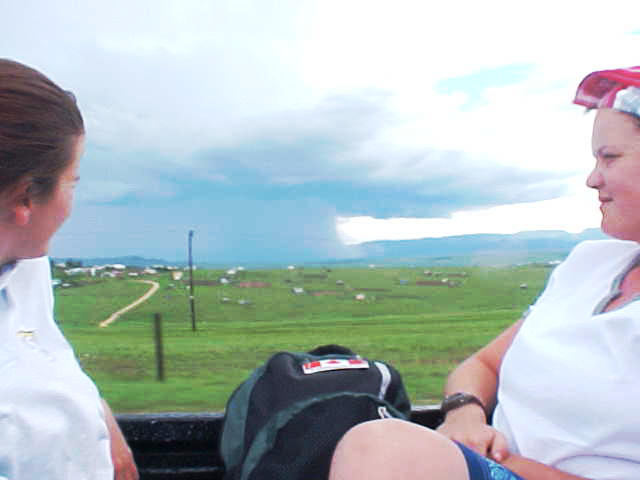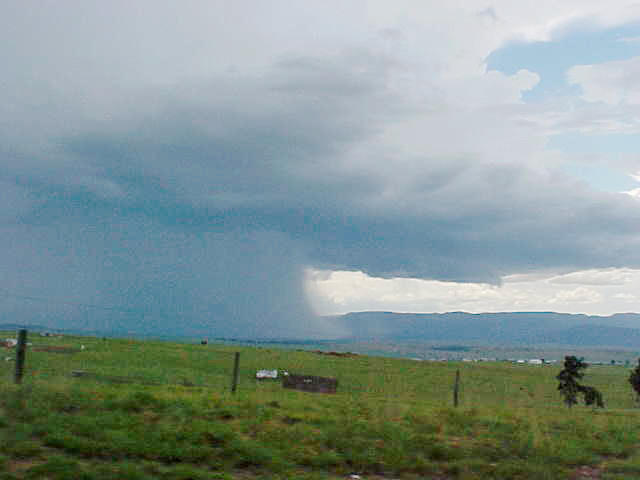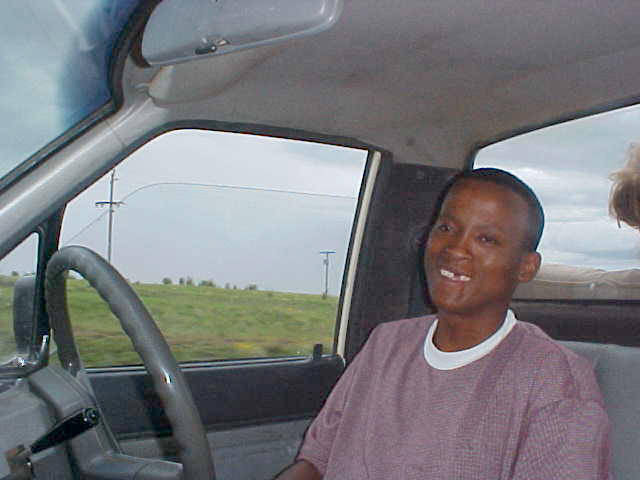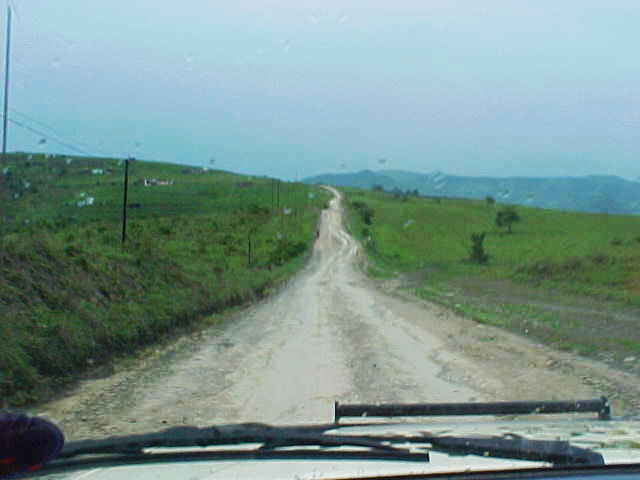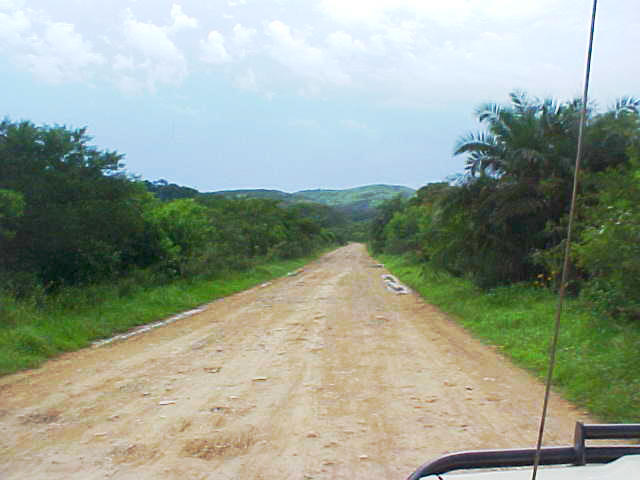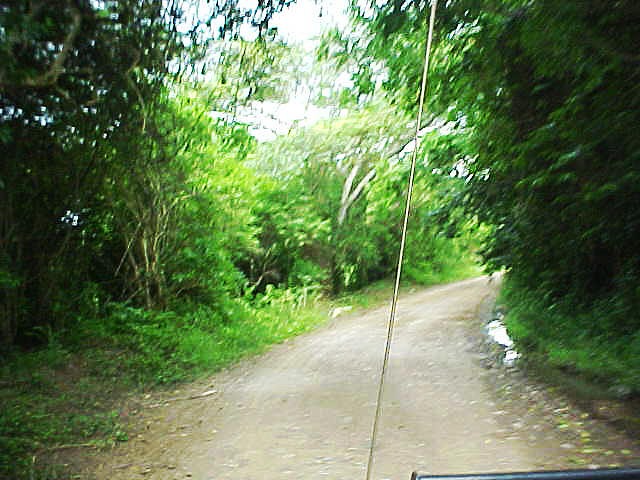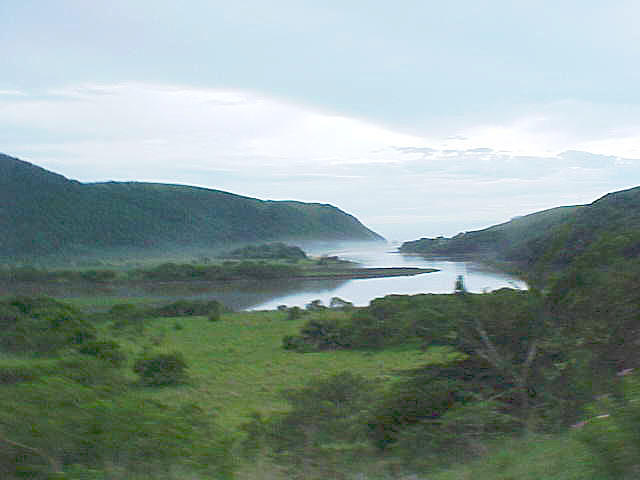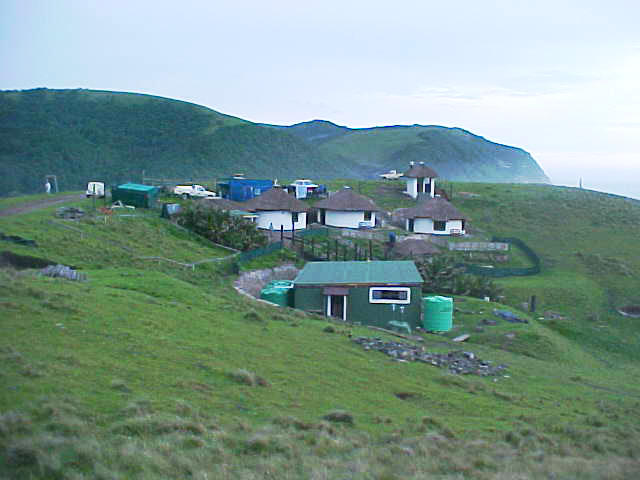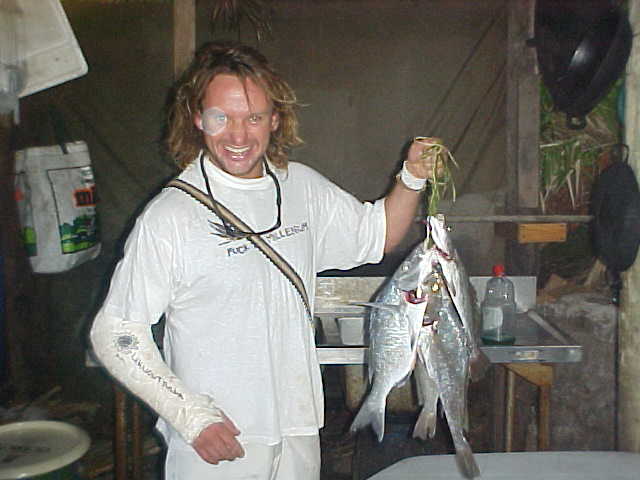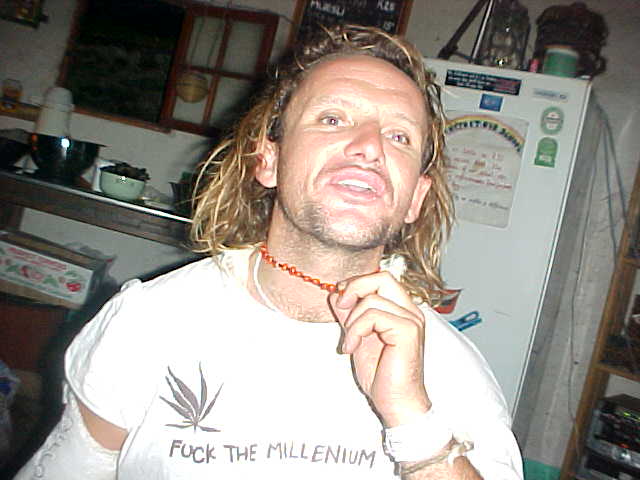
Reports
During my travels, I received free accommodation for a night in exchange for writing a daily travel diary. This diary documented how I reached my next destination, the hosts who welcomed me, the food I was offered, and other experiences along the way. Below, you will find the archives of these extensive reports. Please note that English is not my native language, and most entries were written quickly, often around midnight. Enjoy!Sunday, 18 November 2001
Coffee Bay --> Mpande (SA)
After leaving a bill behind at the Coffee Shack, I travelled all the way to my next destination in Mpande. A sacred place along the Wild Coast... A magic spot... So remote: there is nothing. How long can I stay here?
I was ready to go after having breakfast in the morning. I was ready for the shuttle to bring us back to the shuttle stop in Umtata and a few guests were checking out.
Dawn, the manager of the Coffee Shack, called me to the office. She showed me the bill: free accommodation, free meals, four beers (as promised), but I was asked to pay another 65 Rand on drinks I seem to have consumed in the bar last night. Wow, that is strange! Because I remember very well that I had spent the four beers on my credit; the rest was offered to me by the bartenders.
I know that they love the backpackers for the money, but if they do their ordinary business this way, I don’t believe in it anymore. Some other guests also complained little about the drinks they were offered with a big smile and of course accepted with a big smile – never expecting those presents to come on any bill. Otherwise, don’t offer it – let us just buy it!
So I had to explain Dawn that there was a problem, as I (and here I went again) had ABSOLUTELY NO MONEY. She knew that from the first time I spoke to her.
She finally made a big circle around my bill and told me she would discuss it with David, the owner who wasn’t here these days. Okay with me, I was ready to go...
I jumped in the back of the pickup truck that would take a few guests and me back to Umtata and said goodbye to the funky bunch that I’d leave behind.
Along the route to Umtata, the driver pointed out to a big storm that was passing us by. I was amazed by the beauty of this natural exhibition, as the grey clouds with heavy rainfall and sudden thunders passed by. Meanwhile the rest of the sky was clear blue and right there in the back of the pick up, I was glad I had put on some suncream.
At the Ultra City petrol station in Umtata, I had to wait for a few passengers who would come of the BazBus, before another shuttle service would bring us all to another destination.
Everything here goes through Umtata and there are only a few roads going into the country towards the Wild Coast. And I knew I would come back here again in a few days.
And at the petrol station I even bumped into the Danish girls Britt and Nuna, who were going to the Coffee Shack today. I advised them to be careful with the drinks and enjoy the rest, though.
The driver drove me all the way to Mpande, with two silent Germans in the sitting in the back of the truck. And we conquered sunshine, rain, thunder, and etcetera as the road we drove on gradually disappeared.
It wasn’t going away, it just wasn’t a road anymore. Certainly the last 20 kilometres from a town called Tombo, the only thing left was a dirt track and even that was not really a track anymore. It was potholes all over the place and the rain of the last few days had really done a lot of damage.
The last 20-km took us another hour driving. On tracks like these, going through the dense forests, really all our bones got shaken. It felt like I was part of a jungle expedition and almost expected to cross a wild river in this truck – without a bridge...
But around 6pm we finally arrived in the valley with a warm rural village called Mpande and the exquisite scenery of the lagoon, the green hills and the ocean on the other side dazed me.
I made it again and entered The Kraal backpackers. Now this isn’t an ordinary backpacker’s lodge, this is the most alternative lodge in South Africa. This place has no shops, phones or electricity. It’s just the people, the moonlight and the wonderfulness.
And after last week’s experience at the headman’s house in Coffee Bay, this place was even more different. Just because it has nothing to offer than 100% pure nature and I loved every bit of it.
Philipa settled me in an original mud hut dorm, with eight wooden bunk beds. Philipa wasn’t one of the owners, as I thought, but is a permanent resident at The Kraal as she teaches at the local school – built, owned and run by The Kraal by anybody who feels like it. She came to South Africa to do charity in education, but found out that the South Africans like to receive a lot of money by unnecessary training courses and that is why she ended up at The Kraal.
The school is funded by the backpackers who stay at The Kraal and can always need donations, as every 10 Rand (US$ 1) can support the kids at the school with bread and drinks – one of the main reasons for them to attend the school.
The name The Kraal is Afrikaans for the cattle box that most mud huts have to gather their cattle in. And everything comes from the land or from the cattle the local Xhosa people here have. And that is the philosophy of The Kraal: being there for the locals, not for tourists.
I walked around the area and was astonished by the way of life here. The toilets were situated in a booth on top of a hill, above a 15 metres deep hole. Next to a mud hut living room there were two dorm huts.
A little hour later I met the owner of The Kraal, Dillon, who had been backpacking around the world from ‘92-’96 and visited some 26 countries. On the last leg of his worldtour, he stopped in Thailand for a 10-day Meditation Retreat, doing the silent thing and all, the idea for the Kraal was born: start an eco-village for backpackers and the locals. A way of life was born.
In February ’98 he arrived in Mpande, with a Nissan, 1400some tools, some money, a small dog named Judge and a vision of The Kraal. There was nothing here, except grass on the rolling hills. Everything built here has been done by hand and by the locals. Today at least seven locals are employed here and Dillon is very proud of that as I can read from his speaking.
We sat in the kitchen mud hut, the main meeting place, containing a long wooden table.
The fridge runs on gas, the little music system runs on solar power that attracts electricity from the sun. The water for washing and cooking comes from the river or is pure rainwater. The rare drinking water comes from the hospital, some 10km inland and is stored in a 5,000 litre tank in the back.
There is hot water, every day from 7-8am (for the cleaning ladies) and 5-7pm (for the cooking) thanks to a small fire that is made under the river water tank. To take a shower, a bucket needs to be filled up with warmed water and emptied in a blue tank. Water pipes would lead the water to the shower shed, where I could take a good warm shower.
Dillons arm was coated and he was not able to cut the bread, so I cut the original fresh baked Xhosa bread and prepaired us some tomatoe-garlic-basil sandwiches.
It wasn’t Dillon who had invited me, but his sister Angela Jane, who always urges him to put his place on the maps. But when Dillon heard about my way of life he was very interested in it. “I like people who live their dream a lot,” he said. “That’s what I have been doing too. And I created the Kraal, so there would be a place that can be run by the locals. And if it all works out I can travel the world again, because –of course – that’s what I want to do.”
Dillons arm was coated because he got shot a few weeks ago. He prefers to tell the guests that he fell of his horse, but to me he told the real story.
A few weeks ago he drove through the village when a man hold up a gun to him right next to his car and urged him to stop. “Hell no, I wasn’t going to stop,” and he pushed the gas pedal and made a wave with his arm. At that moment the man shot him, right in his lower arm, near his elbow.
“He thought that he had shot me in the heart, that’s why he only shot once,” but it was in my arm and I kept on driving until I was back here. The staff working here found him in the car, almost in shock, with his arm bleeding heavily.
“It wasn’t painful,” he says. “It’s not at all like in the movies. The gun does click and you feel a tick in the arm. And suddenly there is blood everywhere,” he tells me with a smile on his face – like it was nothing.
The doctor at the hospital could do nothing than just to cover the wound up and let it repair the damage itself. Then in a few days he would look if the bullet needs to be taken out of it is safe to keep the thing inside.
“Of course, I was lucky,” Dillon says, “if he shot me again he would have killed me.” And it was all about his car. He was driving a new 4x4 Toyota Starlight truck and if you drive a car like this, the word goes out.
And if somebody wants to buy such a car but can only pay one-tenth of it, the car hi-jack society comes in action. It was his car they wanted, because it was already sold for 40,000 Rand. They criminals only had to kill the owner (who’s worth nothing to them) and deliver the car to the new owner. For some people, that is very normal in South Africa, too.
But after surviving the shot, the locals went to find out who was behind this. And they found four men who had plotted the hi-jack and hung them on and with their arms tight together on the ceiling of the headman’s mud hut.
And believe me, with the traditional South African way, those guys started talking and told everything. How they did it all, for who the car was going to be and within a week the entire syndicate was taken in by the local people all over the Transkei.
Don’t ask what happened to all of them, but from the stories I heard from Dillon, the men would have a head twice as bigger as normal, of all the beating and torturing and enjoy that for a very long time.
And of course, then the police was called to take them in officially. And don’t come in talking about human rights, this IS South Africa. So even the police played around with these guys, for whom a car is worth more than a human life. Justice is a natural thing here too.
The local staff of the Kraal was preparing fresh caught crayfish (ohoh! it was already out of season!) with potatoes and salad for dinner as Dillon told me all these kind of juicy stories.
The cook, Philipa, Dillon, the guard and me had dinner in this mud hut and the only light there was, came from the candles on the table. The sun had gone down and only a starlight sky was visible.
After dinner and a few beer I went for another walk around the area.
I Have Never Seen Life Like This. In a world were the sun does not shine, I could see clearly: the stars lit up everything. The ocean was blue, the beaches grey and the trees looked greener than ever. And even though the night had set in.
I must have sat on a log on this hill for a very long time, what an inspiration this place is for my mind.
This spot is magic, sacred, and I had already decided I was definitely not going to leave this place tomorrow.
Good night Mpande!
Ramon.
Where am I at this moment?
Click here to see Ludo's map.


